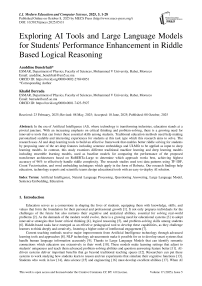Exploring AI Tools and Large Language Models for Students' Performance Enhancement in Riddle Based Logical Reasoning
Автор: Azeddine Benelrhali, Khalid Berrada
Журнал: International Journal of Modern Education and Computer Science @ijmecs
Статья в выпуске: 5 vol.17, 2025 года.
Бесплатный доступ
In the era of Artificial Intelligence (AI), where technology is transforming industries, education stands at a pivotal juncture. With an increasing emphasis on critical thinking and problem-solving, there is a growing need for innovative tools that can foster these essential skills among students. Traditional education methods need help making personalized scalable and interesting experiences for students at this task type which this research aims to solve. The research uses AI and deep learning tools to build an effective framework that enables better riddle solving for students by proposing state of the art deep features including sentence embeddings and ULMfit to be applied as input to deep learning models. In contrast, this study examines different traditional machine learning and deep learning models including ensemble learning models, used as baseline models for comparing the performance of the proposed transformer architectures based on RoBERTa-Large to determine which approach works best, achieving highest accuracy of 96% to effectively handle riddle complexity. The research studies used text data patterns using TF-IDF, Count Vectorization, and word embedding techniques which apply in the form of Roberta. Our research findings help educators, technology experts and scientific teams design educational tools with an easy-to-deploy AI solution.
Artificial Intelligence, Natural Language Processing, Questioning Answering, Large Language Model, Sentence Embedding, Education
Короткий адрес: https://sciup.org/15019967
IDR: 15019967 | DOI: 10.5815/ijmecs.2025.05.01


